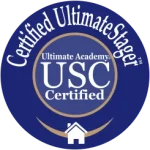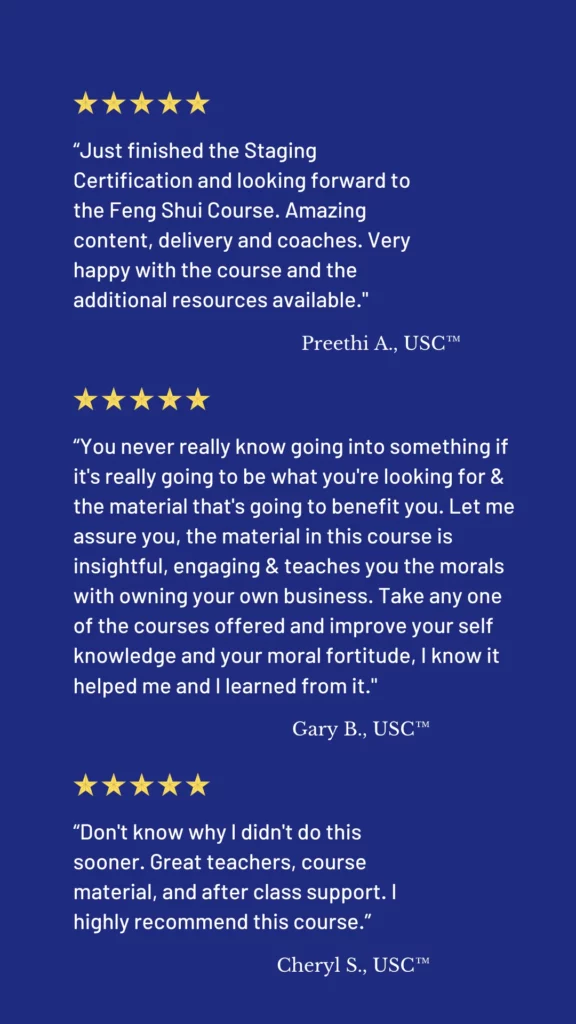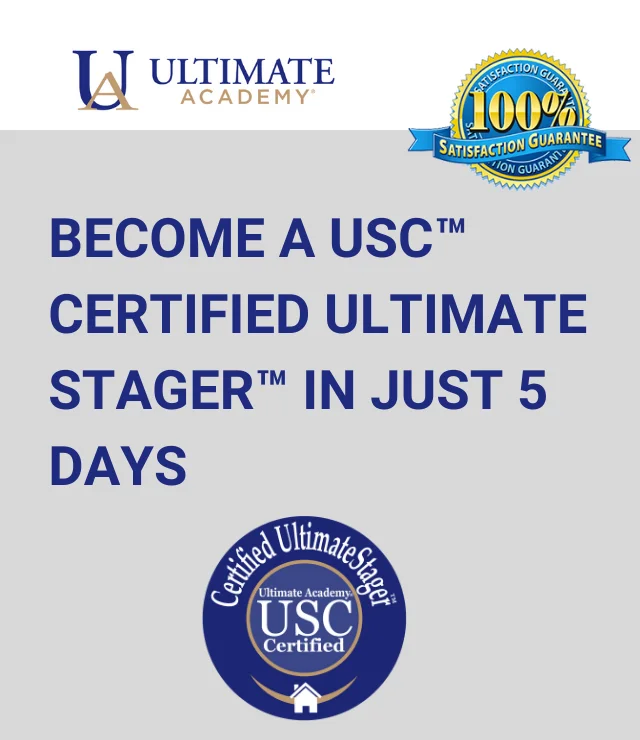How To Start A Home Staging Business

Welcome to the Dynamic World of Home Staging!
Picture transforming everyday living areas into beautiful, marketable properties and earning an income doing so. If you’ve been contemplating how to launch a home staging business, considering how to establish a prosperous staging business, or simply understanding the initial steps of starting in home staging, then you’ve found your starting point.
Let’s delve into the essentials: identifying crucial skills, discovering exciting career paths, accumulating experience as an independent contractor, acquiring pertinent training and certifications, and beyond. This article will serve as your blueprint to converting your flair for design and staging into a flourishing business.
Starting Your Home Staging Business:
Many individuals interested in home staging wonder about the best approach to establish their own business, frequently questioning, “What are the initial steps in creating a home staging company?” or “How can I successfully set up my own staging enterprise?” The solution is more straightforward than you might think.
Embarking on your home staging business journey starts with crafting a clear and compelling mission statement. This statement serves as the foundational narrative of your business, encapsulating goals such as “Elevating properties to their aesthetic best for swift sales,” or “Maximizing property appeal for enhanced market value.” It’s important that your mission resonates deeply with your aspirations and the unique value you plan to provide.
Alongside developing a mission that speaks to your business’s heart, pinpointing your target market is crucial. Understanding the specific group of people who will most benefit from your staging services will enable you to tailor your marketing and outreach strategies effectively, ensuring you connect with the clients who need your vision and skills the most.

How to Start a Home Staging Business?
Embarking on a home staging business journey begins with a passion for aesthetics and function.
Here are key points to consider that will be expanded upon in the following sections:
1. Explore Home Staging Niches
Delve into the market by exploring the demand for home staging services in your locality. Understanding different staging styles and market needs is crucial.
2. Seek Specialized Training and Accreditation
Obtain specialized training and certification from Ultimate Academy® to gain credibility and a clear guide on how to successfully set up and run your home staging business. A certification assures clients of your professionalism and commitment to the industry.
3. Develop Your Brand and Marketing Plan
Your brand should mirror your personal style and the essence of your business, aiming to resonate with your intended audience. Utilize tools like VistaPrint and Canva for crafting professional and distinct marketing materials.
4. Identify Your Primary Clientele
Pinpoint who will benefit most from your services, whether it’s homeowners, real estate agents, developers, or a particular niche within these groups.
5. Set Your Pricing Structure and Services
Decide on a suite of services you’re passionate about and that meet market demands. Consider what you excel at and what might be profitable.
6. Begin Networking and Client Outreach
Start spreading the word about your services and building relationships. Become the face of your brand and actively seek out potential clients in your targeted niche.
1. Explore Home Staging Niches
When starting your home staging business, one of the first steps is to identify and explore various home staging niches. This means looking into specific areas of home staging that you are passionate about or that are in demand.
Niches allow you to specialize and become an expert in a particular style or type of staging, making your business stand out. Here are some popular niches and considerations for identifying your target audience:
Home Staging Niches
Identifying your preferred staging niche is a key step. This will shape the core of your business’s mission and help you clearly define your intended market — essential elements for a solid business framework.
For example, if transforming average homes into showcase properties is where your passion lies, then homeowners and real estate agents may form the bulk of your clientele. This understanding of your service scope and desired impact is foundational for your venture into home staging.
Here are some popular niches and considerations for identifying your target audience:
Luxury Properties: Focusing on high-end homes can be lucrative. This niche requires a keen eye for upscale design and often a higher budget for furnishings and decor.
Vacant Homes: Specializing in staging empty properties can be a significant advantage as they often sell faster when staged. This niche requires a full range of furniture and accessories on hand.
Eco-Friendly and Sustainable Staging: With a growing interest in sustainability, specializing in eco-friendly practices and materials can attract environmentally conscious sellers and buyers.
Urban/Small Spaces: Concentrating on small urban homes or apartments requires creativity in maximizing space and might involve modular or multi-functional furnishings.
Occupied Home Staging: Working with what the homeowner already has, making minimal additions or changes to enhance the property’s appeal.
When identifying your target audience within these niches, consider the following:
- Market Demand: Research your local real estate market to understand what types of properties are sold and what buyers are looking for.
- Real Estate Agent Partnerships: Collaborate with real estate agents who specialize in the niche market you are interested in.
- Demographics: Understand the demographics of the area where you plan to offer your services, including average income, lifestyle, and buyer preferences.
- Personal Passion and Expertise: Choose a niche that aligns with your interests and where you can use your strengths to create a unique offering.
By honing in on a particular niche, you can tailor your marketing strategy, build a strong portfolio, and establish yourself as a go-to expert in that area of home staging, ultimately setting your business up for success.
2. Seek Specialized Training and Accreditation
If you’re considering how to start a home staging business, laying a solid foundation with formal training can significantly boost your credibility. While natural talent is an asset, training programs, such as the one offered at Ultimate Academy®, provide a comprehensive curriculum that sharpens your skills further.
Professional Home Staging Certification Programs
Professional home staging certification programs are designed to provide you with a structured and comprehensive understanding of the home staging industry. These programs often cover:
- Industry Overview: Understanding the role of a home stager, the market demand, and how staging contributes to real estate sales.
- Design Principles and Techniques: Learning the fundamental principles of interior design, such as balance, contrast, and focal points, and how to apply them in staging homes effectively.
- Furniture and Accessories Selection: Guidance on choosing the right furniture, artwork, and accessories that enhance the space and appeal to a broad range of potential buyers.
- Color Schemes and Psychology: In-depth knowledge of how color can affect moods and decisions, and how to choose appropriate colour schemes for various homes and target audiences.
- Space Planning and Organization: Techniques for decluttering, organizing, and arranging spaces to make them appear larger, brighter, and more inviting.
- Client Relations and Business Management: Developing skills in client communication, understanding client needs, managing expectations, as well as handling the business side of staging including contracts, pricing, and marketing strategies.
- Trends and Market Awareness: Keeping up-to-date with the latest trends in home decor and real estate, understanding how economic factors affect the housing market, and adjusting strategies accordingly.
The Ultimate Academy® Advantage
Ultimate Academy®’s home staging course is meticulously crafted to provide an in-depth and multifaceted learning experience for individuals aiming to excel in the home staging industry. Students are immersed in a curriculum that covers the following:
- Theoretical and Practical Aspects: Covers both the foundational knowledge and hands-on techniques of home staging.
- Comprehensive Industry Knowledge: Extensive insights into staging principles, market analysis, and application of staging techniques across various project sizes.
- Technical Staging Skills: Instruction on effective staging methods, including layout, design, and decor selection.
- Business Acumen: Topics on the business side of home staging, including sales, marketing strategies, and entrepreneurship.
- Soft Skills Development: Emphasis on client communication, relationship management, project coordination, and ethical practices crucial to the home staging industry.
- Targeted Learning: Designed for aspiring entrepreneurs and professionals seeking a thorough understanding and skill set in home staging.
This course is designed to empower students with the knowledge, techniques, and business savvy needed to forge a successful career in the dynamic and creative world of home staging.

3. Develop Your Brand and Marketing Plan
Creating a brand identity and strategic marketing plan is essential for distinguishing yourself in the home staging industry. A strong brand conveys your unique style, values, and professionalism, while a well-crafted marketing plan is vital for ensuring your target audience is aware of and trusts your services.
Here’s how our Home Staging course can assist you in developing each aspect:
Brand Identity
- Defining Your Style: The course helps you explore various home staging styles and guides you in identifying or crafting your distinctive approach, which will be a central part of your brand identity.
- Creating a Logo and Visual Elements: Learn about the significance of visual elements such as logos, color schemes, and typography that resonate with your brand’s aesthetic and attract your target market.
- Developing a Brand Voice: Gain understanding in articulating your brand through content, be it your website, blog posts, or social media updates, ensuring it connects with your audience.
Marketing Plan
- Understanding Your Target Market: The course underscores the need to identify and comprehend your ideal clients, including their preferences, behaviors, and the specifics of the real estate market they are part of, which is crucial for any effective marketing strategy.
- Utilizing Different Marketing Channels: Discover various marketing channels such as social media, email marketing, content marketing, and traditional advertising, and learn how to effectively utilize them to engage and attract your target audience.
- Creating a Marketing Strategy: Receive guidance on developing a cohesive marketing strategy that integrates various tools and platforms, ensuring a consistent and appealing brand message.
- Implementing and Evaluating Marketing Tactics: Learn not only to implement these strategies but also to evaluate and tweak them based on performance, ensuring optimal results and return on investment.
By focusing on these critical aspects of brand and marketing development, Ultimate Academy®’s home staging course equips you with the necessary skills and knowledge to build a recognizable and appealing brand, along with a strategic marketing plan that enhances business growth and client engagement.
This comprehensive approach ensures you’re not just learning the theoretical components of branding and marketing but are also gaining practical skills and insights that can be directly applied to launching and expanding your home staging business.
4. How Do You Grow Your Home Staging Business? Establish a Client Base:
Establishing a client base is a crucial element of any thriving home staging business. It involves recognizing the needs and preferences of potential clients and devising strategies to connect and engage with them effectively. Here are steps to approach this essential aspect of your business:
Understanding Client Needs
- Conduct Market Research: Initiate by researching your target market to understand the preferences, challenges, and expectations of potential clients specifically in the real estate and home staging sector.
- Client Consultations: Offer one-on-one consultations to understand each client’s unique needs. Tailor your home staging solutions to each specific project for optimal results.
- Feedback Loop: Create a system for receiving and analyzing client feedback. Continuous improvement based on feedback ensures services are aligned with client expectations.
Making Connections Through Networking
- Industry Events and Trade Shows: Participate in home staging, real estate, and design-related events to network with potential clients and industry peers.
- Local Community Involvement: Engage in local community events, join business networks, or partner with real estate agencies to boost visibility and credibility.
- Online Networking: Leverage social media platforms, online forums, and networks like LinkedIn to connect with potential clients and other home staging professionals.
Expanding Client Base
- Referral Programs: Implement referral programs to incentivize satisfied clients to recommend your services. Word-of-mouth is particularly powerful in home staging.
- Targeted Marketing: Utilize insights from your market research to create focused marketing campaigns that resonate with your target demographic, whether through social media, email marketing, or other channels.
- Personalized Approach: Customize your home staging services for each client. Providing tailored solutions can greatly enhance client satisfaction and lead to repeat business and referrals.
Leveraging Client Relationships
- Build Trust: Maintain consistency, reliability, and transparency to cultivate trust with clients. Trust is vital for repeat business and referrals in home staging.
- Ongoing Communication: Stay in touch with previous clients through updates, newsletters, or seasonal greetings to remain at the forefront of their minds for future staging needs or referrals.
- Upselling and Cross-Selling: Identify opportunities to offer additional services or package deals that clients might find valuable.
By understanding client needs, effectively networking, expanding your client base through strategic marketing, and leveraging existing relationships, you can establish a robust and loyal client base. This approach not only assists in acquiring new clients but also helps in retaining them, ensuring the sustained growth and success of your home staging business.

5. Set Your Pricing Structure and Services for Your Home Staging Business
Determining the appropriate pricing structure and clearly defining the scope of your services are essential steps in launching a successful home staging business. The goal is to balance competitive pricing with maintaining profitability. Here’s a strategy to approach this:
Understanding Cost and Value
- Market Research: Research what other home stagers are charging in your area. Understand the market rate for various staging services and how they’re typically offered.
- Cost Analysis: Calculate all your costs including rental furniture, accessories, transportation, labor, overhead, and any other expenses. This ensures your pricing covers costs and provides a profit margin.
Developing a Pricing Matrix
- Pricing Strategies: Explore different pricing strategies like cost-plus (adding a markup to your cost), value-based pricing (charging based on perceived value to the client), or competitive pricing (aligning with market rates).
- Pricing Structure: Decide if you’ll charge by the hour, per project, or offer packaged services. Consider what’s standard in home staging and what works best for your business model and clientele.
- Flexibility: Be flexible with your pricing for special circumstances or loyal clients, but always ensure you’re adequately compensated for your expertise.
Clearly Define Scope of Services
- Detailed Proposals: Provide clients with detailed proposals outlining what is included in your services, what isn’t, and any conditions or limitations. This sets clear expectations and helps avoid misunderstandings.
- Customization: Be ready to customize packages based on client needs, ensuring profitability.
- Transparency: Maintain transparency about your pricing and the factors that influence it, building trust and justifying your rates.
Ultimate Academy®'s Home Staging Course Approach to Pricing
Ultimate Academy®’s home staging course offers comprehensive guidance on establishing a well-structured pricing strategy:
- Pricing Matrix: Learn to develop a pricing matrix considering cost, market rate, and perceived value, positioning your services competitively in the market.
- Pricing Exercises: Engage in pricing exercises that simulate real-world scenarios to understand pricing nuances and effective rate communication and negotiation.
- Business Acumen: Emphasize not just staging skills but also business savvy, with pricing as a critical component.
Setting a clear, competitive, and profitable pricing structure, and defining your service scope, ensures a sustainable business model that attracts and retains clients. Ultimate Academy®’s home staging course is designed to provide the knowledge and practical experience needed for informed pricing decisions, helping you establish and grow your home staging business confidently.
With the right knowledge, tools, and guidance, your journey from an aspiring home stager to a successful business owner is both achievable and rewarding. Take the step to transform your passion into a thriving career with Ultimate Academy® and begin your journey in transforming spaces today.



Learn About our Home Staging Certification


Similar Articles
FAQs About Starting a Home Staging Business
Online Presence: Create a professional website and maintain active social media profiles showcasing your projects, testimonials, and services.
Networking: Build relationships with real estate agents, developers, and contractors who can refer your services to homeowners.
Content Marketing: Write blogs or articles on home staging tips and trends to establish yourself as an expert in the field.
Local Advertising: Utilize local online newspapers, magazines, or home improvement trade shows to advertise your services.
Referral Programs: Encourage word-of-mouth marketing by offering incentives for clients or partners who refer new business to you.
While certification is not mandatory for home staging, obtaining one can significantly benefit your business in several ways.
The USC™ Certified UltimateStager™ certification has been earned by thousands of home stagers across North America, solidifying its reputation as a trusted credential within the industry. Realtors prefer to collaborate with certified home stagers, as they have demonstrated their dedication to excellence and adherence to industry standards.
Here are some ways you can benefit from obtaining a certification:
Boosts Credibility: Achieving certification assures your clients of your professionalism and commitment to delivering high-quality staging services. It instills confidence in potential clients and sets you apart from uncertified competitors.
Enhances Skills: Certification programs typically offer comprehensive training that equips you with industry-standard techniques, knowledge of current design trends, and best business practices. This knowledge and expertise can be invaluable when working on diverse staging projects.
Expands Network: Becoming certified connects you with a community of fellow professionals who share your passion for home staging. This network can provide valuable support, opportunities for collaboration, and access to potential mentors who can help you further develop your skills and grow your business.
Certification can serve as a valuable asset to your career. It not only boosts your credibility in the eyes of clients and realtors but also equips you with the necessary skills and expands your professional network, ultimately contributing to your success in the home staging industry.
Home staging can be a fulfilling and profitable career for those with a passion for design and real estate. It offers:
Creativity: Each project is a new canvas to express your design skills.
Flexibility: Many home stagers are self-employed, allowing for a flexible schedule.
Satisfaction: There is immense satisfaction in transforming a space and helping homes sell faster and often for a higher price.
Variety: Every home is different, offering new challenges and learning opportunities.
Yes, home staging is in demand, especially as the real estate market continues to emphasize the value of well-presented homes. Factors driving demand include:
Competitive Market: Sellers seek to make their property stand out in the real estate market.
Visual Appeal: Online listings with professionally staged photos attract more potential buyers.
Proven Results: Staged homes tend to sell faster and for higher prices, encouraging more sellers to invest in staging services.
Home stagers often get business through:
Real Estate Agent Partnerships: Collaborating with agents who recommend staging services to their clients.
Portfolio and Online Showcasing: Displaying before-and-after photos and client testimonials on websites and social media.
Networking Events: Attending industry events, workshops, and local community gatherings to meet potential clients and partners.
Direct Marketing: Reaching out directly to homeowners, real estate investment groups, or offering free seminars on home staging.
Quality Service: Providing exceptional service that leads to repeat business and referrals from satisfied clients.













